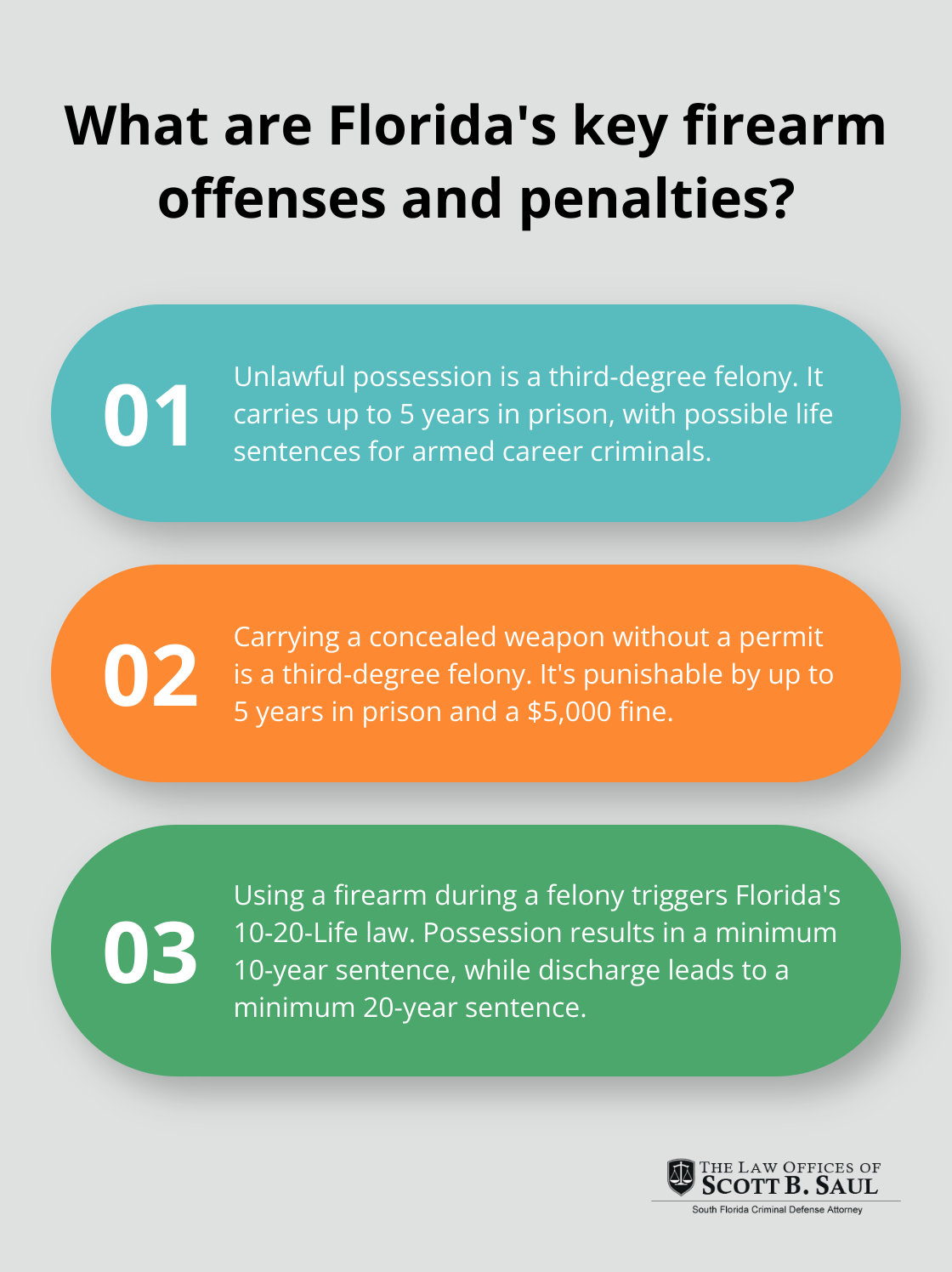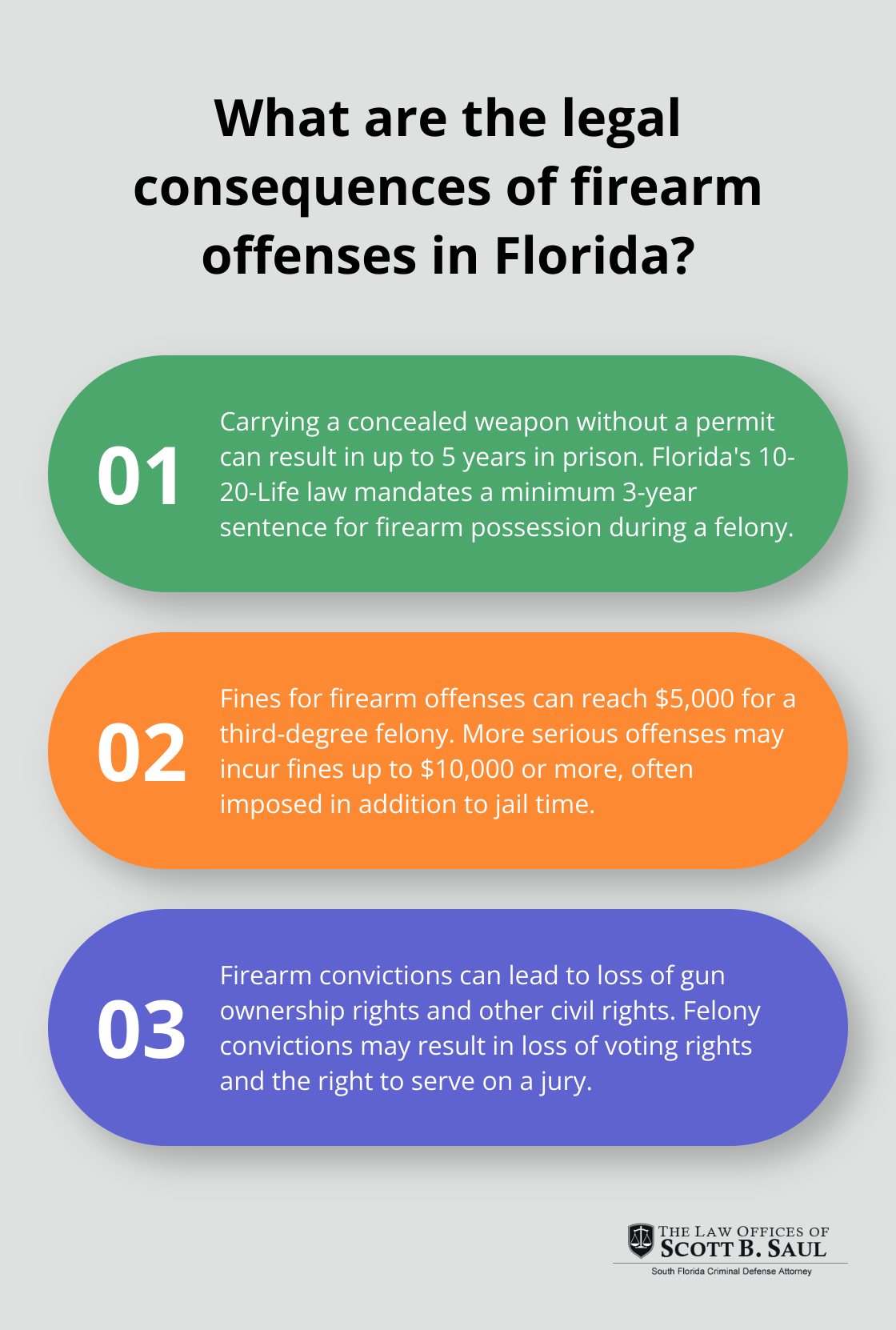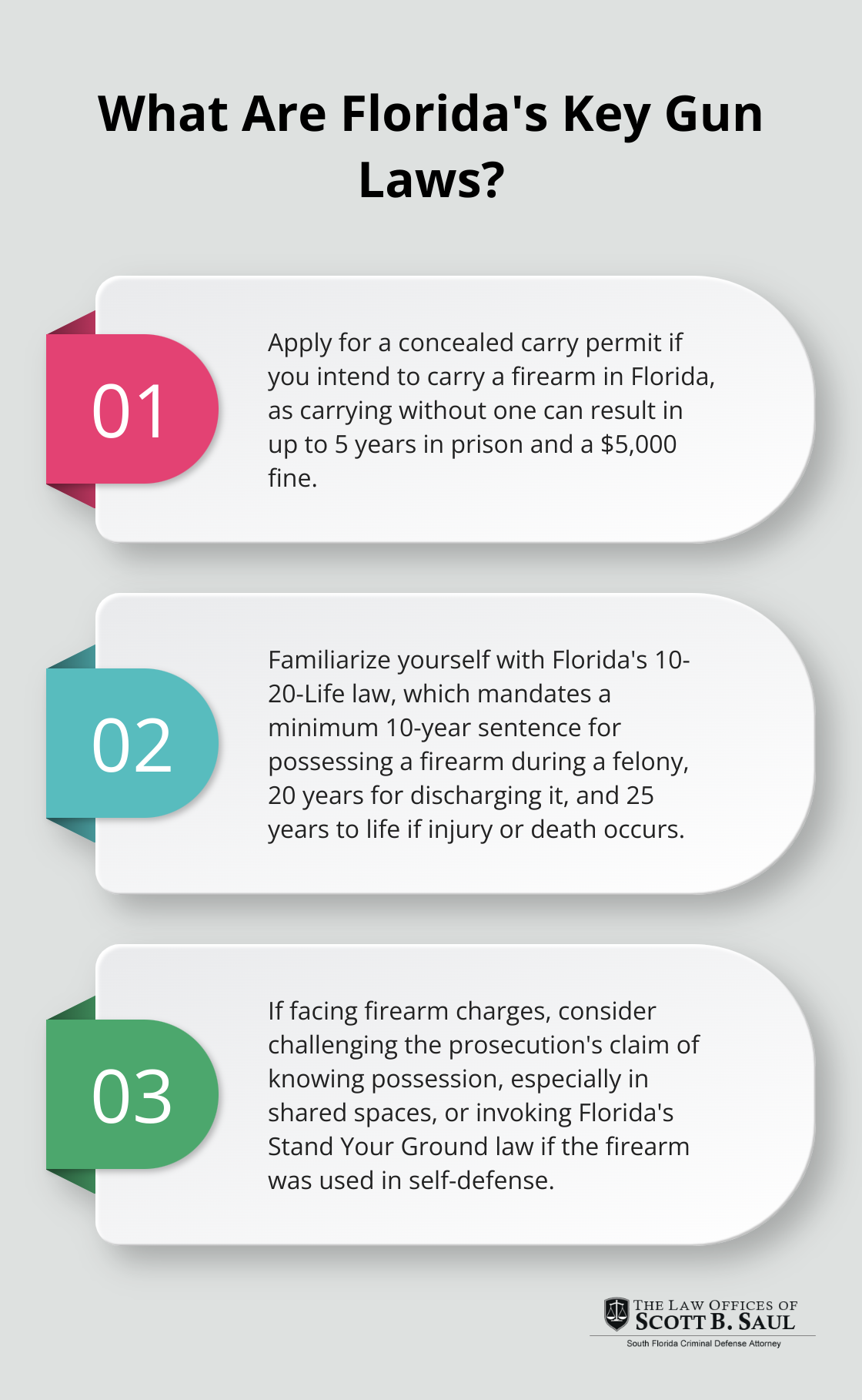Firearm Offenses: Legal Consequences Explained
By : saulcrim | Category : Criminal Defense | Comments Off on Firearm Offenses: Legal Consequences Explained
28th Nov 2024

Firearm offenses in Florida carry serious legal consequences that can impact your life for years to come. Understanding these offenses and their potential penalties is crucial for gun owners and those facing charges.
At Law Offices of Scott B. Saul, we’ve seen firsthand how firearm-related charges can drastically alter a person’s future. This post will break down the types of offenses, their consequences, and possible defenses to help you navigate this complex legal landscape.
Common Firearm Offenses in Florida
Florida’s gun laws present a complex legal landscape, and violations can result in severe penalties. This chapter explores several prevalent firearm offenses in the state.
Unlawful Possession of Firearms
Under federal law, people are generally prohibited from purchasing or possessing firearms if they have been convicted of a felony or some domestic violence offenses. The penalties for unlawful possession are severe:
- Third-degree felony charges carry up to 5 years in prison
- Armed career criminals may face life sentences
Carrying a Concealed Weapon Without a Permit
Florida requires a license to carry a concealed firearm. Carrying a concealed weapon is a third degree felony, punishable by up to five years in prison and a fine up to $5,000. Repeat offenses can escalate to felony charges.
Illegal Sales or Transfers of Firearms
The sale or transfer of firearms to unauthorized individuals is a serious offense. This includes transactions with minors, convicted felons, or individuals with mental health issues. Penalties range from second-degree misdemeanors to second-degree felonies, depending on the circumstances.
Use of a Firearm in the Commission of a Crime
Using a firearm during the commission of a felony represents one of the most severe firearm offenses. Florida’s 10-20-Life law mandates minimum sentences for such crimes:
- Possessing a firearm during a felony: Minimum 10-year sentence
- Discharging a firearm: Minimum 20-year sentence
- Injury or death caused: Minimum 25 years to life

These offenses represent only a fraction of the firearm-related charges that occur in Florida. Each case presents unique circumstances that can significantly impact potential consequences and defense strategies. The next section will examine the legal consequences of these offenses in greater detail, providing a comprehensive understanding of the potential ramifications for those facing firearm charges.
Legal Consequences of Firearm Offenses
Firearm offenses in Florida carry severe legal repercussions that extend far beyond the courtroom. These consequences can reshape an individual’s life, impacting everything from personal freedom to future opportunities.
Jail Time and Financial Penalties
The severity of jail time for firearm offenses in Florida varies widely. Carrying a concealed weapon without a permit can result in up to five years in prison. However, using a firearm during a felony triggers Florida’s 10-20-Life law, mandating a minimum 3-year sentence for possession of a firearm. In cases where the offender discharges the firearm, this jumps to a 20-year minimum. If someone suffers injury or death, the sentence escalates to at least 25 years or even life imprisonment.

Financial penalties also hit hard. Fines for firearm offenses can reach $5,000 for a third-degree felony, while more serious offenses may incur fines up to $10,000 or more. Courts often impose these fines in addition to jail time, creating a dual burden of incarceration and financial strain.
Loss of Gun Ownership Rights
A conviction for a firearm offense often results in the loss of gun ownership rights. This restriction can be temporary or permanent, depending on the nature of the offense. In many cases, individuals convicted of felony firearm offenses face federal penalties including imprisonment not to exceed 10 years and 3 years of supervised release.
Impact on Civil Rights
Beyond gun rights, a firearm conviction can lead to the loss of other civil rights. Felony convictions may result in the loss of voting rights, the right to serve on a jury, and even impact child custody arrangements. These consequences extend far beyond the immediate legal penalties, affecting an individual’s role in society for years to come.
Career and Housing Challenges
The ripple effects of a firearm conviction often extend into professional and personal spheres. Many employers conduct background checks, and a firearm offense can be a red flag that closes doors to job opportunities. Certain professions (particularly those involving security or law enforcement) become virtually inaccessible with a firearm conviction on record.
Housing can also become a challenge. Landlords frequently run background checks on potential tenants, and a firearm conviction may lead to rejected rental applications. This can force individuals into less desirable housing situations, potentially impacting their quality of life and future prospects.
The severe and far-reaching consequences of firearm offenses underscore the importance of a robust legal defense. The next chapter will explore potential defense strategies that individuals facing firearm charges can employ to protect their rights and mitigate these life-altering repercussions.
Effective Defenses for Firearm Charges
Challenging Possession and Knowledge
One of the most common defenses involves challenging the prosecution’s claim that you knowingly possessed a firearm. Some common affirmative defenses in federal firearm possession cases include self-defense, duress, and entrapment. This defense proves particularly effective in cases where law enforcement finds the firearm in a shared space (such as a vehicle with multiple occupants). In such scenarios, the prosecution must prove beyond a reasonable doubt that you knew about the firearm and had control over it.
Exposing Constitutional Violations
Law enforcement must follow strict procedures when they conduct searches and seizures. Any violation of your Fourth Amendment rights can lead to evidence suppression. This powerful defense strategy often results in case dismissal. Courts deem evidence inadmissible when obtained through unconstitutional means, which can significantly weaken the prosecution’s case.
Invoking Self-Defense Laws
Florida’s Stand Your Ground law provides strong protections for individuals who use firearms in self-defense. The common law principle of “castle doctrine” says individuals have the right to use reasonable force, including deadly, to protect against an intruder in their home. This defense requires a thorough examination of the circumstances surrounding the incident and often involves expert testimony to support your claim.
Disputing Weapon Classification
Firearm laws often hinge on specific definitions and classifications of weapons. Challenging these classifications can serve as an effective defense strategy. For instance, antique firearms often receive exemptions from certain regulations. Technical defenses that dispute the legal definition of a weapon can lead to charge reductions or dismissals.
Leveraging Expert Testimony
Expert witnesses play a critical role in many firearm defense cases. These professionals can provide testimony on various aspects, including ballistics, weapon functionality, and crime scene analysis. Their expertise can cast doubt on the prosecution’s evidence or support your version of events. Courts often give significant weight to expert testimony, making it a valuable tool in your defense arsenal.

Final Thoughts
Firearm offenses in Florida carry severe consequences that reshape lives. These offenses lead to harsh penalties including lengthy prison sentences, substantial fines, and the loss of gun ownership rights. The impact extends far beyond the courtroom, affecting employment prospects, housing opportunities, and even basic civil rights.

Given the complexity of firearm laws and the gravity of potential consequences, seeking experienced legal representation becomes essential. A skilled attorney can navigate the intricacies of your case, challenge evidence, and employ effective defense strategies to protect your rights and future. At Law Offices of Scott B. Saul, we bring decades of experience in criminal defense to your case.
Our team understands the nuances of firearm offenses from both sides of the courtroom. We specialize in defending tourists and foreign travelers, offering personalized attention and aggressive representation to safeguard your interests. If you face firearm charges in South Florida, contact Law Offices of Scott B. Saul today for a comprehensive consultation.
Archives
- December 2024 (8)
- November 2024 (5)
- July 2024 (2)
- June 2024 (2)
- May 2024 (2)
- April 2024 (2)
- March 2024 (2)
- February 2024 (2)
- January 2024 (2)
- December 2023 (2)
- November 2023 (2)
- October 2023 (2)
- September 2023 (2)
- August 2023 (1)
- July 2023 (2)
- June 2023 (2)
- May 2023 (2)
- April 2023 (2)
- March 2023 (2)
- February 2023 (2)
- January 2023 (2)
- December 2022 (2)
- November 2022 (2)
- October 2022 (2)
- September 2022 (2)
- August 2022 (2)
- July 2022 (2)
- June 2022 (2)
- May 2022 (2)
- April 2022 (2)
- March 2022 (2)
- February 2022 (2)
- January 2022 (2)
- December 2021 (2)
- November 2021 (2)
- October 2021 (2)
- September 2021 (2)
- August 2021 (2)
- July 2021 (2)
- June 2021 (2)
- May 2021 (2)
- April 2021 (2)
- September 2020 (5)
- July 2020 (4)
- June 2020 (4)
- May 2020 (4)
- April 2020 (5)
- March 2020 (4)
- February 2020 (4)
- January 2020 (4)
- December 2019 (1)
- November 2019 (4)
- October 2019 (4)
- September 2019 (4)
- August 2019 (4)
- July 2019 (5)
- June 2019 (4)
- May 2019 (4)
- April 2019 (4)
- March 2019 (4)
- February 2019 (4)
- January 2019 (4)
- December 2018 (4)
- November 2018 (5)
- October 2018 (5)
- September 2018 (4)
- August 2018 (4)
- July 2018 (7)
- June 2018 (4)
- May 2018 (4)
- April 2018 (8)
- March 2018 (4)
- February 2018 (4)
- January 2018 (4)
- November 2017 (4)
- October 2017 (4)
- September 2017 (4)
- August 2017 (7)
- July 2017 (6)
- June 2017 (4)
- May 2017 (4)
- April 2017 (4)
- March 2017 (4)
- February 2017 (7)
- January 2017 (4)
- December 2016 (7)
- November 2016 (4)
- October 2016 (4)
- September 2016 (10)
- August 2016 (4)
- July 2016 (4)
- June 2016 (4)
- May 2016 (4)
- April 2016 (4)
- March 2016 (4)
- February 2016 (7)
- January 2016 (4)
- December 2015 (5)
- November 2015 (4)
- October 2015 (7)
- September 2015 (4)
- August 2015 (4)
- July 2015 (13)
- June 2015 (9)
- May 2015 (8)
- April 2015 (6)
- March 2015 (4)
- February 2015 (4)
- January 2015 (4)
- December 2014 (4)
- November 2014 (4)
- October 2014 (4)
- September 2014 (3)
Categories
- Adjudication (1)
- Bankruptcy (1)
- Burglary Crimes (3)
- calendar call (1)
- Car Accident (1)
- Criminal Defense (277)
- Cyber Crimes (7)
- DNA (1)
- Domestic Violence (9)
- Drug Crimes (5)
- DUI (12)
- Embezzlement (1)
- Environmental Crimes (4)
- Expungement Law (2)
- Federal Sentencing Law (3)
- Firearm (3)
- Forgery (4)
- General (82)
- Healthcare (3)
- Immigration (1)
- Indentity Theft (1)
- Insurance (5)
- judicial sounding (2)
- Juvenile Crimes (4)
- Manslaughter (4)
- Money Laundering (3)
- Organized Crime (1)
- Racketeering (1)
- Reckless Driving (3)
- RICO (3)
- Sealing and Expunging (2)
- Sex Offense (1)
- Shoplifting (1)
- Suspended Driver's License (1)
- Traffic (4)
- Trending Topics (1)
- White-collar Offenses (1)

